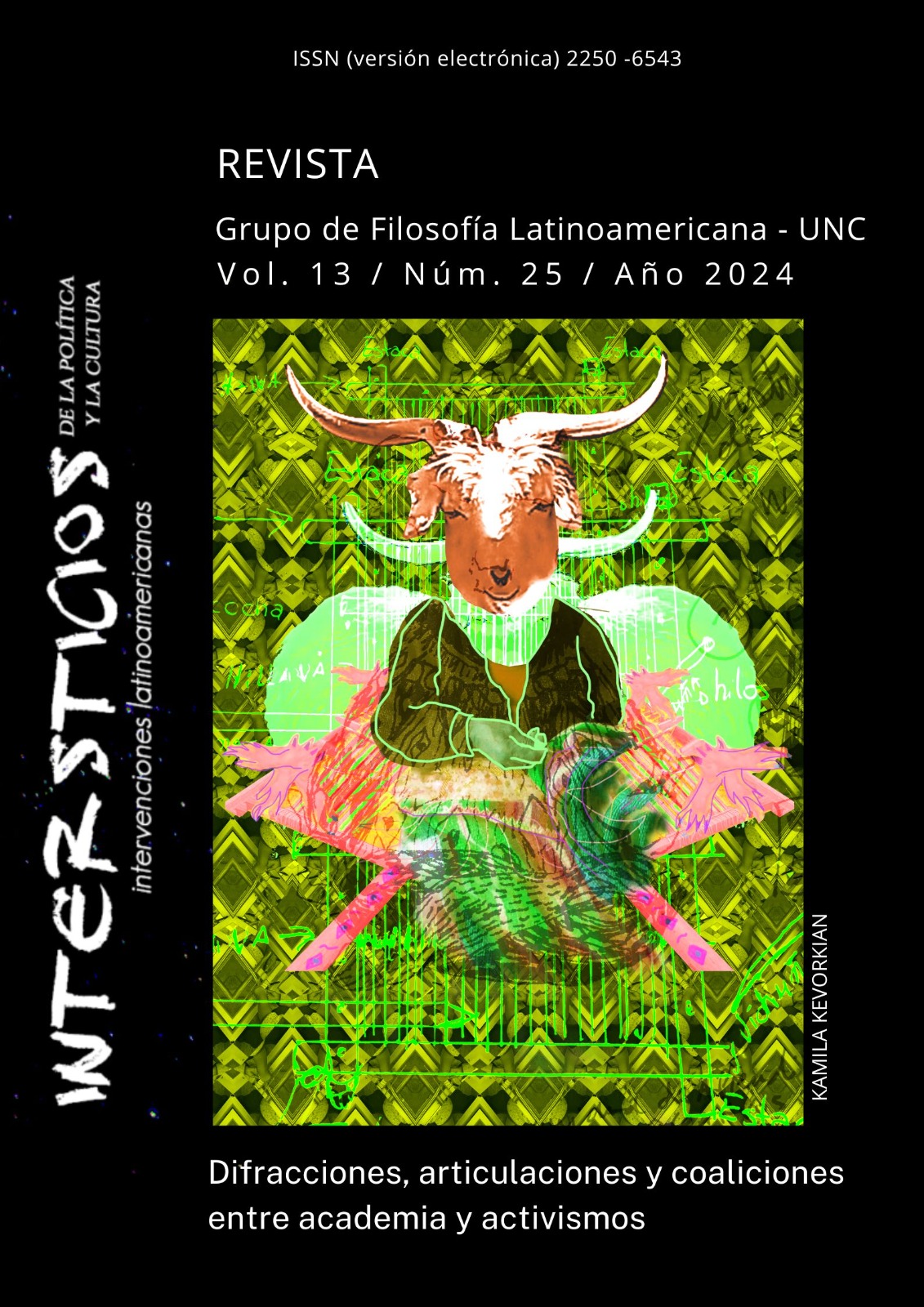Concerns and irruptions of feminist epistemologies in academic-investigative work
Keywords:
feminists epistemologies, relacional ontologies, thinking-with careAbstract
This article proposes to explore different contributions of feminisms in the construction of knowledge, while presenting itself as an opportunity to problematize the research and academic itineraries of the writer. For this reason, this paper forms an exercise in itself, which places in scene some questions coming from feminist epistemologies, that enable the propagation of different questions that affect the investigative work. At first, with keys promoted by the epistemologies of the point of view, the relevance of reflecting on who investigates, what link there is between the everyday worlds we inhabit and the world of academia is investigated. In a second instance, the focus is on engaging with the issues-problems being investigated and the world horizons to which they pay. In a third and final moment, ontologies and relational epistemologies are themed, attending to some keys promoted by the community feminism of Lorena Cabnal and the multi-species feminism of Haraway.
Downloads
References
Bach, Ana María (2010). El rescate del conocimiento. Temas de mujeres, 6(6), 5-30. Recuperado de: http://ojs.filo.unt.edu.ar
Bartra, Eli (1998). Reflexiones metodológicas. En: Bartra, Eli (Comp.) Debates en torno a una metodología feminista. México: Universidad Autónoma Metropolitana, UnidadXochimilco.
Blaser, Mario (2010). Storytelling Globalization from the Chaco and Beyond. Durham: Duke University Press.
Borsani, María Eugenia (2021). Rutas decoloniales. Buenos Aires: Ed. del Signo y Duke University.
Cabnal, Lorena (2018). Acercamiento a la construcción de la propuesta de pensamiento epistémico de las mujeres indígenas feministas comunitarias de Abya Yala. En: Momento de paro, tiempo de rebelión. Miradas feministas para reinventar la lucha. Minerva ediciones. Fundación Rosa Luxemburgo.
De la Cadena, Marisol (2018). Aperturas onto-epistémicas: conversaciones con Marisol de la Cadena. Antípoda. Revista de Antropología y Arqueología, (32).
Escobar, Arturo (2016). Autonomía y Diseño: La realización de lo comunal. Popayán: Editorial Universidad del Cauca.
Gutiérrez Aguilar, Raquel, María Noel Sosa e Itandehui Reyes (2018). El entre mujeres como negación de las formas de interdependencia impuestas por el patriarcado capitalista y colonial. En: Momento de paro, tiempo de rebelión. Miradas feministas para reinventar la lucha. Minerva ediciones. Fundación Rosa Luxemburgo.
Haraway, Donna (1995). Conocimientos situados: la cuestión científica en el feminismo y el privilegio de la perspectiva parcial. En: Ciencia, ciborgs y mujeres. La reinvención de la naturaleza. Madrid: ediciones cátedra. 313-345.
_____ (2019). Seguir con el problema. Bilbao: Consonni.
Lugones, María (2008). Colonialidad y género. En: Yuderkys Espinosa Miñoso, Diana Gomez Correal y Karina Ochoa, Tejiendo de otro modo: Feminismo, epistemología y apuestas descoloniales en Abya Yala.
_____ (2021). Peregrinajes. Teorizar una coalición contra múltiples opresiones. Buenos Aires: Ediciones del Signo.
Puig de la Bellacasa, María. (2017a). Matters of Care. Speculative Ethics in More than Human Worlds. Minneapolis: University of Minnesota Press.
_____ (2017b). Pensar con cuidado. Revista Concreta, (9), 27-47.
Pérez-Bustos, Tania (2016). El tejido como conocimiento, el conocimiento como tejido: reflexiones feministas en torno a la agencia de las materialidades. Rev. Colomb. Soc., 39 (2), 163-182. doi: http://dx.doi.org/10.15446/rcs.v39n2.58970
Downloads
Published
Issue
Section
License

This work is licensed under a Creative Commons Attribution-NonCommercial-ShareAlike 4.0 International License.
Authors who have publications with this journal agree to the following terms:
a. Authors will retain their copyright and grant the journal the right of first publication of their work, which will simultaneously be subject to the Creative Commons Attribution License that allows third parties to share the work as long as its author and first publication in this journal are indicated.
b. Authors may adopt other non-exclusive license agreements for distribution of the published version of the work (e.g., deposit it in an institutional telematic archive or publish it in a monographic volume) as long as the initial publication in this journal is indicated.
c. Authors are allowed and encouraged to disseminate their work through the Internet (e.g., in institutional telematic archives or on their web page) after the publication process, which may produce interesting exchanges and increase citations of the published work (see The effect of open access).


